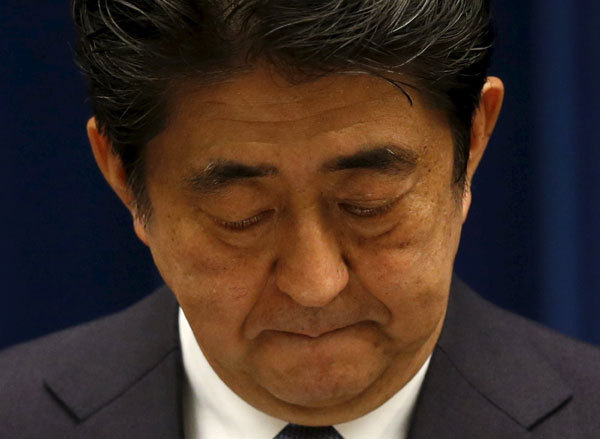Japan's past can't be forgiven without sincere apology
- By Zhang Feng
 0 Comment(s)
0 Comment(s) Print
Print E-mail China Daily, September 1, 2015
E-mail China Daily, September 1, 2015
|
|
|
Japan's Prime Minister Shinzo Abe attends a news conference for delivering a statement marking the 70th anniversary of World War II's end, at his official residence in Tokyo, August 14, 2015. [Photo/Agencies] |
Japanese Prime Minister Shinzo Abe did mention "colonial rule", "aggression", "profound self-reflection" and "apology" in his speech on Aug 14 to mark the 70th anniversary of Japan's surrender in World War II, but he avoided endorsing the words that former Japanese prime minister Tomiichi Murayama used in 1995 to own up to his country's war past that helped Japan win the trust of some of its Asian neighbors.
Despite Abe's deliberate act of omission, some people both at home and abroad see his statement as a kind of "progress", with some even arguing that China should be more tolerant toward Abe in a bid to show its self-confidence.
In fact, the recent past has seen some people arguing that China should stop repeatedly asking Japan to apologize for its past atrocities because it could have the opposite effect on Japanese people and would thus be unfavorable to the healthy development of Sino-Japanese ties. Instead, they say, China should play down the unpleasant past and look to the future by recognizing Japan's contribution to postwar regional peace and development.
Such arguments may apparently sound appealing but are meaningless in reality, because Japan and its leaders have to give neighboring countries enough reason to shelve the past and look to a better future with Japan. The truth is Abe has not made even the slightest effort to eschew his rightwing leaning; rather he has been taking measures to revise history and offend all peace-loving people, including Japanese.
After Abe's Aug 14 speech, even some Japanese scholars said that, in essence, it violated the "Murayama Statement" despite not disproving it. And some Western scholars believe Abe's remarks reveal his intention to attribute Japan's invasion of Asian countries before and during WWII as a military action under pressure from Western powers. This, the Western scholars say, is a blatant attempt to cover up Japanese aggression by confusing it with "defense".







Go to Forum >>0 Comment(s)